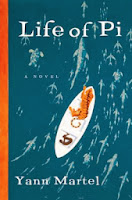 Feed, by M. T. Anderson. Candlewick Press, 2012.
Feed, by M. T. Anderson. Candlewick Press, 2012.It is a hundred years in thefuture, and people no longer walk around with their faces in their mobile devices. Instead, everyone has implanted chips that stream their feeds 24/7: news, entertainment, advertisements, chat... Google and Wikipedia are always available.
For a lark, a group of friends decides to go to the moon for the day, but it turns out that "the moon sucks." Titus, the main character meets Violet on the moon, but she heretically resists the feed and, by actually having original thoughts and opinions, becomes the catalyst for the events that occur when the feed becomes corrupted.
This is a satirical, hyperbolic and frightening look at what could happen if the only information you get is what you've selected for your feed, and what your "smart" feed thinks you will like, based on prior choices. The dialogue captures teen conversational style accurately. It's a topic also covered more seriously in Eli Pariser's The Filter Bubble.











